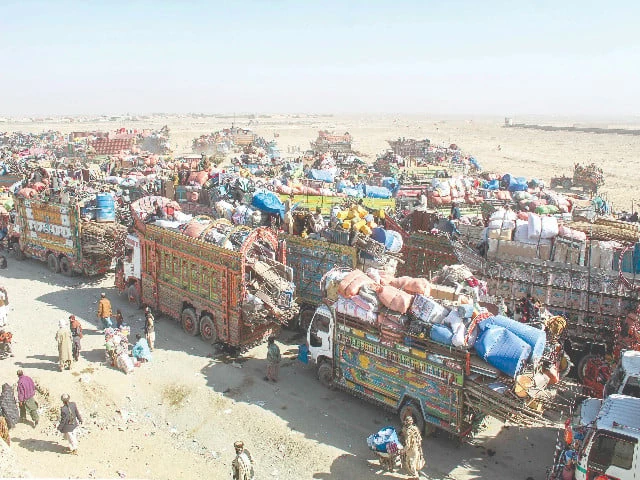Afghan refugees with their belongings in trucks wait to be deported to Afghanistan, near the Chaman border post. Photo: AFP
TORKHAM:
Pakistan on Saturday reopened the Torkham border post in Khyber-Pakhtunkhwa to returning Afghan refugees, ending a nearly two-week closure following deadly clashes between border forces last month.
Meanwhile, nearly 10,700 people returned through the Chaman border in a single day, with authorities expanding the process at the crossing.
The repatriation of Afghan families with or without travel or identity documents was abruptly suspended on October 11 following border clashes between Pakistan and Afghanistan, which continued for days before a ceasefire was formalized in Doha on October 19.
Pakistan has closed all its borders with Afghanistan to all types of movement. Since then, many returning families have been eagerly awaiting the reopening of the Torkham border.
Since then, trade between the countries has remained suspended, leading to an increase in prices of essential commodities, including tomatoes.
Although Islamabad and Kabul decided on Friday to extend the ceasefire, Foreign Ministry spokesperson Tahir Andrabi said that “the border remains closed to trade for now” and that the resumption of trade would depend on the security situation.
Officials previously said all affected personnel had been notified to ensure their presence on duty Saturday morning. It was unclear whether Pakistanis stranded in Afghanistan would be allowed to return.
According to official figures, around 1.56 million Afghan nationals have now returned to their country as part of the government’s ongoing repatriation campaign. The process took place in accordance with legal and administrative protocols, ensuring that each individual’s documents are verified before crossing the border.
The authorities assured that the repatriation initiative was carried out in a dignified and orderly manner and has now been extended to Torkham following its recent reopening.
Officials said the Frontier Corps (FC) and civil administration had arranged temporary shelters, food supplies and medical facilities for the departing families. The state ensured that all humanitarian needs of Afghan refugees were met during the transition, an official said.
Similarly, Khyber Deputy Commissioner Bilal Rao confirmed the reopening, saying the crossing had resumed operations to facilitate the repatriation of Afghan nationals.
Afghan and Pakistani officials, including Khizer Shah, spokesperson for the Pakistani embassy in Kabul, also checked on the developments.
The process of repatriating Afghan families, with or without valid travel or identity documents, had been suspended since October 11, when cross-border clashes broke out between the security forces of the two countries.
The border clashes, which lasted several days, only ended after a ceasefire was formalized in Doha on October 19.
Following the violence, Pakistan closed all border crossings with Afghanistan for both trade and travel, leaving thousands of returning families stranded on both sides. The shutdown also disrupted bilateral trade, triggering a surge in prices of essential goods, especially perishable products like tomatoes, in local markets.
Although Islamabad and Kabul agreed on Friday to extend the ceasefire, Foreign Ministry spokesperson Tahir Andrabi said the border remained closed to trade for the time being, adding that commercial activity would only resume after a review of the security situation.
According to Khyber officials, all affected border agents were ordered to report to work early Saturday to facilitate the return of refugees. However, it was not immediately clear whether Pakistani nationals stranded in Afghanistan would also be allowed to return to the country.




